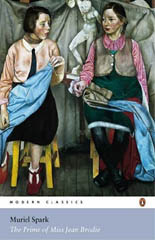By
The Influences of my School Days
‘What were the main influences of your school days, Sister Helena? Were they literary or political or personal? Was it Calvinism?’
Sandy said: ‘There was a Miss Jean Brodie in her prime.’
I arrived in Edinburgh by way of a book. Muriel Spark’s The Prime of Miss Jean Brodie was one of the novels I read during my first term at Edinburgh University. I had known it since my early teens and it had kept me company like an old friend. I was ready for a sense of déjà-vu. The book transformed itself once more. I was learning about the ‘death of the author’ and the birth of as many readings as there are readers. Muriel Spark was still very much alive at the time, but the book had come to life, and could exert its own influence through the chemistry of its signs. Vampiric, it needed the blood of new readers. I don’t suppose I took this theory too seriously at the time, but with hindsight I am becoming convinced of the truth of it.
Give me a girl at an impressionable age, and she is mine for life. I’ve sat beneath the elm tree with the other girls and listened to Miss Brodie’s storytelling. I’ve blurred the line between the real and the fictional in my constant re-crossing. My first encounter with the world of Muriel Spark was aural: I was given a tape for Christmas one year. I can hear it still: the voice of Geraldine MacEwan – dry, ironical – bringing the tilting inflections of Spark’s Edinburgh to my ear. ‘For those who like that sort of thing,’ said Miss Brodie in her best Edinburgh voice, ‘that is the sort of thing they like.’
There was an added strangeness in listening, rather than reading – a reader can skip back a couple of pages, do a double-take. Listening is more passive. You believe you are taking it all in when in fact you are skimming the surface.
I must have been enjoying the fictional world too much to notice the strangeness of the flash-backs and flash-forwards, the deliberate disconcertions of the technique. I was drawn to the story of an inspirational teacher and her treasured set of girls. I was about the same age as the girls and my life lacked a Miss Brodie figure, with her intense pronouncements on Art and her unapologetic elitism. I was grateful to meet my fantasy in fiction. I just wanted to be part of the Brodie set and I admired Miss Brodie unconditionally. I was indeed, a girl at an impressionable age.
I had been to Edinburgh only once before I arrived as a student. I was ten years old and I stayed with my uncle and aunt, who had a house on Colinton Road, with a garden leading down to the canal and a neighbour called Muriel (I remember thinking it was a strange, exotic name, like being called Muesli). I stayed a week at most, but my impressions were lasting. The sight, for instance, of a maroon bus pushing its way past leafy gardens on Belford Road. I have memories lying dormant all over Edinburgh.
As a child I had seen Edinburgh in the summer. As a student, my term began in October and the days steadily darkened. Edinburgh in the winter is a sublime and frightening place. By the time I came to read The Prime of Miss Jean Brodie for my course there was menace in the air: ‘The days passed and the wind blew from the Forth.‘ We were learning how words shape and alter our reality. I was beginning to realise how Spark’s descriptions had coloured my vision of Edinburgh.
My window looks out on the back of a row of fine tenements, a cobbled street curving away to the right, a line of new buildings. In the purple summer twilight and the turquoise glow of an office front, the city seems poised for its next incarnation: ghostly, elegant or sinister. Edinburgh remains for me always a mixture of the real and the fabulous.
©Rachel Boase 2006


Comments